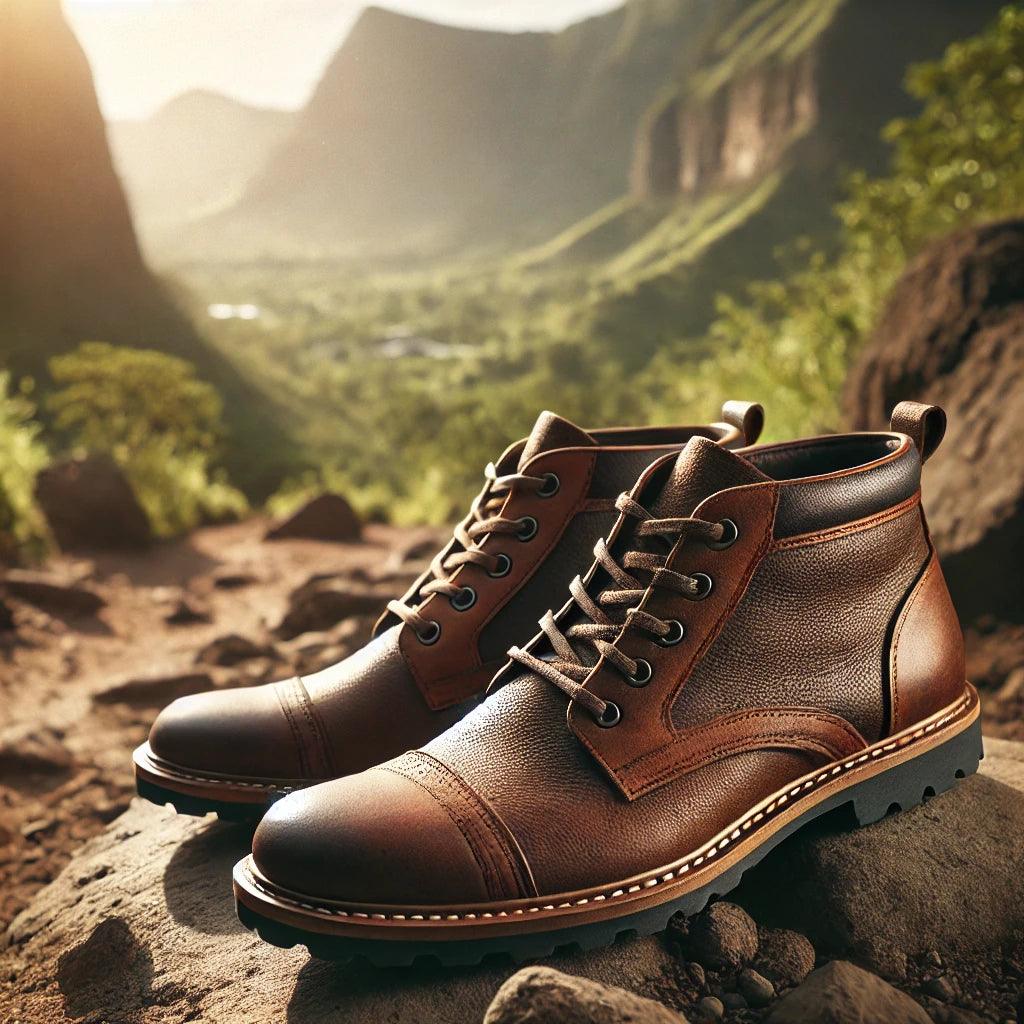
Are Chukka Boots Good for Hiking? A Comprehensive Guide to Style and Performance
Share
Did you know there are 59 million active hikers in the United States? When it comes to hiking boots, you’ve probably heard all the classics—heavy-duty leather, rugged soles, high ankle support. But what about chukka boots? These sleek, stylish shoes are more commonly seen in the office or on casual outings, yet some adventurous souls have started taking them on the trail. The question is: Are chukka boots good for hiking? Let’s dive into the pros, cons, and everything in between.
If you’re anything like me, you want versatility in your gear. Who doesn’t want a pair of shoes that can handle rocky paths one minute and look sharp at dinner the next? Finding a balance between function and fashion has always been tricky. But as hiking becomes more mainstream, people are looking for a mix of performance and style—even on the trails. That's where chukka boots come in.
Before you toss out your trusty hiking boots, let's break down the facts and find out if chukka boots could really be the right choice for your next outdoor adventure.
What Are Chukka Boots?
Before we dive into whether chukka boots are good for hiking, let's cover what they actually are. Chukka boots (usually suede chukka boots or nappa chukka boots) are ankle-length shoes, traditionally made with leather or suede and designed with a minimalist look. They typically have two or three pairs of eyelets for lacing and often feature a thinner sole compared to standard hiking boots.
Chukkas are often praised for their versatility—straddling the line between casual and semi-formal wear. But here’s the big question: Can they handle the rough terrain of a hiking trail, or should they be reserved for more civilized outings?
Pros and Cons of Chukka Boots for Hiking
1. Design & Aesthetic Appeal
One of the primary reasons people are drawn to chukka boots is their timeless, sleek design. Unlike bulky hiking boots, chukkas are refined and can be worn in both outdoor and social settings.
Pros:
- Stylish and Versatile: Chukka boots are incredibly versatile. You can wear them with jeans, chinos, or even with a casual suit. For those who like to pack light, a pair of chukkas can transition from the trail to dinner seamlessly.
- Lightweight: Most chukka boots, especially those made from suede or light leather, are lighter than traditional hiking boots. Less weight on your feet can make a huge difference when you’re on the move.
Cons:
- Limited Ruggedness: The minimalist design, while appealing, lacks the ruggedness needed for intense hiking trips. Chukka boots typically don’t have the same level of protection, particularly around the ankle and toe areas, which are crucial for more challenging trails.
- Not Ideal for Extreme Conditions: Chukka boots generally don’t come with reinforced soles or weatherproofing like dedicated hiking boots. If you're facing wet, muddy, or snowy conditions, they might not hold up as well.
2. Comfort and Support
Support is a crucial factor when choosing footwear for hiking. Traditional hiking boots are built with features like ankle support, cushioned insoles, and shanks for added stability. Chukka boots, on the other hand, are designed more for casual comfort.
Pros:
- Comfortable for Short Hikes: Many chukka boots, especially those made with premium leather, are soft and comfortable right out of the box. They don’t require much of a break-in period, unlike some hiking boots.
- Breathability: Chukkas made from suede or unlined leather are more breathable, which can be a benefit during warm-weather hikes.
Cons:
- Lack of Ankle Support: Hiking boots are designed with high tops and extra padding to support your ankles, especially on uneven terrain. Chukka boots, with their lower cut, offer little to no ankle support.
- Sole Design: Most chukka boots have thin, flat soles, which are great for walking around town but not for rugged, rocky trails. You might feel every sharp rock underfoot.
When Are Chukka Boots Good for Hiking?
Now that we’ve laid out the pros and cons, let’s get into specifics. Under what circumstances are chukka boots good for hiking?
1. Short, Casual Hikes
If you're planning a leisurely walk through a flat, well-trodden trail or park, chukka boots can be a good option. For instance, if you’re traveling in Europe and want to explore both urban environments and some gentle countryside paths, a pair of chukkas can handle both settings.
They’re lightweight, stylish, and comfortable enough for walks that don’t require serious hiking gear.
2. Dry, Mild Weather Conditions
Hiking in dry, mild weather? Chukka boots can work well. Their breathability means your feet won’t get too hot, and the lack of heavy waterproofing won’t be an issue as long as the terrain is dry.
For example, if you’re taking a trip to the American Southwest, where trails are often dry and temperatures are mild, chukka boots could be a stylish, functional alternative to traditional hiking shoes.
When Are Chukka Boots NOT Good for Hiking?
While chukka boots have some uses on the trail, they’re not suited for every situation. Here are times when you should definitely not choose chukka boots for hiking.
1. Rugged Terrain
If you’re planning to hike on rocky, uneven, or challenging terrain, leave your chukkas at home. The lack of ankle support and thick soles will leave you vulnerable to twisted ankles, stubbed toes, and a less comfortable hike overall.
2. Wet or Muddy Conditions
Chukka boots are not built for wet weather. Even if you buy a waterproof pair, most chukkas won’t stand up to hours of walking in rain or through mud. The last thing you want is water seeping into your shoes halfway through a hike.
3. Long-Distance Hikes
If you’re planning a multi-day hike or a trek through the mountains, chukka boots simply don’t have the durability to match. Even if you get through the first day unscathed, the wear and tear on your boots—and feet—will show over time. Traditional hiking boots are designed with reinforced soles and shanks for stability; chukkas don’t have this extra support.
How to Choose the Right Chukka Boots for Hiking
If you’re set on trying chukka boots for your hiking adventures, here are a few tips to make sure you get the best pair for your needs.
1. Look for Reinforced Soles
Not all chukka boots are created equal. Look for ones with a thicker, more durable sole. While you won’t find the same level of reinforcement as a hiking boot, you can find chukkas with solid rubber soles that provide more grip and protection.
2. Consider Waterproofing
If you plan on hiking in unpredictable weather, opt for waterproof chukka boots. Keep in mind that even the best waterproofing will only last a few hours, but it can still save your feet during short hikes in wet conditions. Protecting your shoes Liquiproof Premium Protector can also be an option
3. Try Before You Hike
Make sure to wear your chukka boots around town for a while before hitting the trail. Like all good footwear, they’ll need some breaking in, and you’ll want to ensure they’re comfortable for longer walks before you tackle a hike.
Conclusion: Are Chukka Boots Good for Hiking?
So, are chukka boots good for hiking? The answer isn’t a straightforward yes or no—it depends on the conditions and the kind of hike you’re planning. If you’re going on a short, casual hike in dry weather, chukka boots can be a stylish, comfortable option. But if you’re heading into rugged, wet, or long-distance terrain, you’re better off sticking to traditional hiking boots.
The best advice? Know your route, your needs, and the limitations of your footwear. With the right preparation, you can find the perfect balance between function and fashion on
